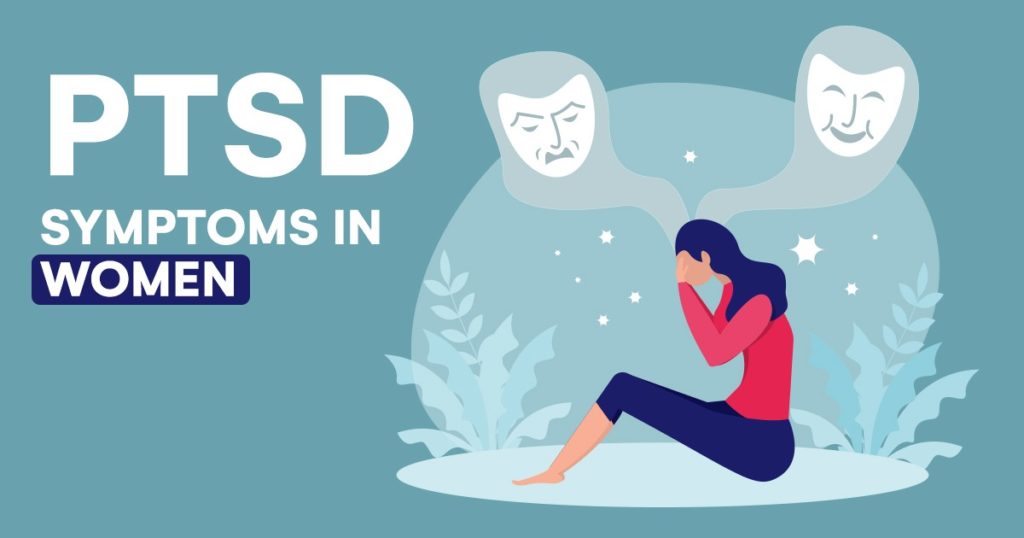
Post-Traumatic Stress Disorder (PTSD) can profoundly impact anyone who has gone through a traumatic experience, yet studies indicate that PTSD symptoms in women often present differently than those in men. Understanding these differences is essential for creating supportive, effective care tailored to the unique needs of women. Women are at a higher risk of developing PTSD, with around 8% experiencing symptoms in their lifetimes, compared to 4% of men. This increased prevalence is partly due to the types of trauma women are more likely to encounter, including sexual assault and domestic violence, which are strongly linked to PTSD in women. Recognizing common PTSD symptoms in women—such as heightened anxiety, emotional numbness, and increased vigilance—can provide valuable insight into how PTSD uniquely affects women, making gender-specific support critical in the journey toward recovery.
Contact Us to Learn About PTSD Treatment for Women.
What is PTSD?
PTSD is a mental health disorder that can develop after someone experiences or witnesses a traumatic event, leading to persistent, distressing thoughts and emotions long after the incident has passed. PTSD in women can manifest in various ways, influenced by individual trauma experiences and other contributing factors, including age and background. While PTSD can affect anyone, symptoms can differ greatly based on gender, highlighting the need to recognize how PTSD affects women differently to ensure effective, personalized care.
What Are PTSD Symptoms in Women?
Women with PTSD may experience a wide range of symptoms, categorized into four main areas:
1. Re-Experiencing the Trauma
- Intrusive thoughts or memories of the event: Distressing memories often intrude unexpectedly, affecting women’s ability to focus on daily life.
- Nightmares related to the trauma: Recurring trauma-related dreams can disrupt sleep and heighten distress.
- Flashbacks, feeling as if the event is happening again: Women may intensely relive the trauma, feeling as though it’s occurring in the present.
- Severe emotional distress or physical reactions to reminders of the trauma: Triggers can cause extreme reactions, including panic and physical symptoms like sweating.
2. Avoidance
- Avoiding places, people, or activities that remind them of the trauma: Women may avoid situations or people that bring up painful memories.
- Refusing to talk about the event or feelings associated with it: Avoiding conversations and emotions about the trauma can delay healing.
3. Negative Changes in Thinking and Mood
- Persistent negative thoughts about oneself or the world: Ongoing pessimism and a sense of hopelessness can weigh heavily on women.
- Distorted feelings of guilt or blame: Many women experience excessive guilt or self-blame related to the trauma.
- Loss of interest in activities once enjoyed: Apathy toward hobbies or social activities often replaces former interests.
- Feelings of detachment or estrangement from others: Numbing emotions can make it challenging to connect with loved ones.
4. Hyperarousal and Reactivity
- Being easily startled or frightened: Women may have an exaggerated startle response and feel constantly on edge.
- Constantly feeling on edge or tense: Hypervigilance keeps women in a state of readiness for perceived danger.
Difficulty sleeping or concentrating: Anxiety and intrusive thoughts often disturb sleep and focus.
Irritability or angry outbursts: Quick temper and irritability can strain personal relationships and daily interactions.
Recognizing these common female PTSD symptoms allows for effective trauma-informed support tailored to women’s experiences and needs.
Female PTSD Signs to Watch For
PTSD in women often stems from specific types of trauma that increase susceptibility to stress responses. Some of the most common PTSD triggers in women include:
- Sexual Assault and Abuse: Sexual violence can have profound, lasting psychological effects.
- Domestic Violence: Ongoing abuse in intimate relationships heightens the risk of PTSD.
- Childhood Trauma: Early-life abuse or neglect can lead to PTSD later if not addressed.
- Loss of a Loved One: Violent or sudden loss can lead to intense grief and trauma reactions.
- Natural Disasters or Accidents: Life-threatening events can be particularly traumatic.
- Military Combat and War: Women in the military may experience combat or military sexual trauma.
- Medical Trauma: Health crises or emergency procedures can also trigger PTSD.
Understanding these triggers helps in early identification of trauma in women and the provision of supportive care.
Long-Term Effects of PTSD
The long-term effects of PTSD can reach beyond the trauma, affecting mental health and daily functioning. For some women, untreated PTSD may lead to chronic conditions like depression, anxiety, or substance use disorders, as they attempt to manage their symptoms. Emotional numbness, heightened vigilance, and flashbacks can strain relationships and disrupt careers, while contributing to a diminishing sense of self-worth and motivation for recovery.
In addition to mental health challenges, PTSD can also impact physical well-being. Women with PTSD may experience increased risk of cardiovascular issues, weakened immune systems, and chronic pain conditions. This is often due to the body’s ongoing stress response, which can wear down physical health over time. These combined impacts underscore the importance of seeking trauma-informed care for women with PTSD, addressing both the mental and physical effects to improve long-term quality of life.
Unique Aspects of PTSD in Women
While PTSD symptoms can overlap between men and women, certain aspects are more prevalent in women:
- Higher prevalence of emotional responses: Women are more likely to exhibit internalizing symptoms such as depression and anxiety.
- Greater likelihood of experiencing sexual trauma: Women are more likely to develop PTSD following sexual assault or domestic violence.
- Increased risk of comorbid conditions: Women with PTSD often experience other mental health issues such as eating disorders, substance abuse, and chronic pain.
Cognition and Mood Symptoms
These symptoms can lead you to feel alienated or withdrawn from your loved ones. You might have trouble remembering key facts of the traumatic event. These symptoms could lead you to negatively view yourself or the world, and you could have guilt or blame yourself.
Cognition and mood symptoms also include a loss of interest in things you once found enjoyable. While it’s relatively normal to experience some or all of these symptoms as part of your reactions to trauma, if they last for more than a month, it might indicate you have PTSD.

Are PTSD Symptoms in Women Different?
PTSD symptoms in women may be different from what men experience. For example, PTSD symptoms in women are more likely to include being easily startled and feeling numb. You may have a hard time experiencing emotions. Avoidance is more common in women than men, and women with a history of PTSD are more likely to experience depression and anxiety than men.
The symptoms may last longer in women than men. For example, women have symptoms on average for four years, while men, on average, experience symptoms for a year. If you’re a woman with PTSD, you are less likely to have a drug abuse problem after the trauma compared to a man.
Is PTSD More Common in Males or Females?
There are gender differences in the prevalence of PTSD. Healthcare providers estimate that one in 10 women will develop symptoms of PTSD during their lifetime. As a woman, you are around twice as likely as a man to develop PTSD. The most common type of trauma women experience is sexual assault, and the rates are higher than in men. Women are also more likely to experience childhood abuse or domestic violence in their life, which can lead to PTSD.
PTSD Treatment for Women: Effective Strategies
It is essential for women experiencing PTSD to seek professional help. Effective treatment options include:
- Psychotherapy: Cognitive Behavioral Therapy (CBT), Eye Movement Desensitization and Reprocessing (EMDR), and prolonged exposure therapy are particularly beneficial.
- Medication: Antidepressants such as SSRIs can help manage symptoms.
- Support groups: Connecting with others who have similar experiences can provide a sense of community and understanding.
What Happens when PTSD Is Not Treated?
We want to emphasize the risks of untreated PTSD. When you have untreated post-traumatic stress disorder, it’s doubtful symptoms will just go away. Instead, what happens without treatment is that more complications and comorbidities can develop.
For example, not getting proper treatment and mental health care can make you susceptible to drug and alcohol abuse, sleep problems, and depression. There are also links between not getting treatment and then developing chronic pain. Other long-term effects of PTSD that goes without treatment include:
- Anger management issues—you may start to have angry outbursts. These anger problems can lead to violence in your life or the breakdown of relationships.
- Loneliness—you may end up withdrawing from the people who care about you, leading to isolation.
- Comorbid depression—this is a considerable risk of untreated PTSD Major depression can cause suicidal thoughts and behaviors.
- Substance abuse—the potential for substance misuse to occur is mentioned above, and we can’t overstate the risk of this. When you have any mental health condition for which you’re not getting treatment, it increases your risk of developing a drug or alcohol problem. The increased risk could be due to multiple factors. For example, if you’re not getting professional treatment, you might attempt to self-medicate with drugs or alcohol. Also, the areas of the brain playing a role in mental disorders contribute to addiction.
The most powerful message we want you to take away from this is that you don’t have to suffer alone; if you’re a woman with Post Traumatic Stress Disorder (PTSD), Anchored Tides Recovery can help. Whether it’s stemming from sexual violence, military combat, substance abuse, or another traumatic event, we are here for you. Treatments are available to help improve your quality of life and relationships and lower your risk of developing complications like an addiction to drugs or alcohol. Contact us at (866) 329-6639 to learn more.
Recognizing and Managing PTSD Symptoms in Women
For women, recognizing early signs of PTSD can be challenging but is a crucial step toward seeking support and improving well-being. Ways women can recognize early PTSD symptoms include being mindful of changes in mood, such as persistent feelings of guilt or anxiety, and noticing avoidance behaviors—like steering clear of certain places or conversations—that may signal unresolved trauma. Self-help techniques for managing PTSD symptoms can include practicing mindfulness to stay grounded, setting up a support system with trusted friends or family, and establishing a routine to maintain stability.
Seeking Help for PTSD Symptoms in Women
At Anchored Tides Recovery in Orange County, CA, we provide specialized support for women affected by PTSD through trauma-informed therapy and women-focused mental health programs that address the unique ways trauma impacts women. Our services are designed to help women navigate symptoms and work toward healing in a supportive, understanding environment. For those seeking a structured path to recovery for themselves, a wife, or daughter, Anchored Tides offers compassionate, professional care, creating a clear and actionable path from understanding symptoms to accessing effective treatment.
Frequently Asked Questions Related to PTSD
What are the unique PTSD symptoms in women?
Women with PTSD may show symptoms such as emotional numbness, heightened guilt or shame, and increased anxiety, differing from how PTSD presents in men.
How does PTSD affect women differently from men?
PTSD in women tends to manifest as depression, anxiety, and avoidance behaviors, while men may show more anger and aggression-related symptoms.
Why are women more likely to develop PTSD than men?
Women are at a higher risk due to greater exposure to specific traumas, like sexual assault and domestic violence, which are strongly linked to PTSD.
Can PTSD symptoms in women change over time?
Yes, the intensity of PTSD symptoms can vary based on life events and stress levels, requiring ongoing support to manage.































